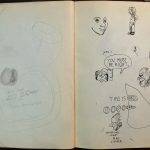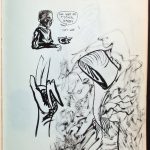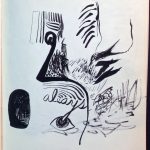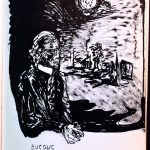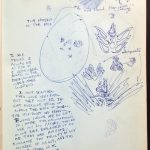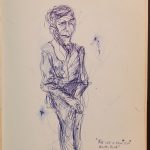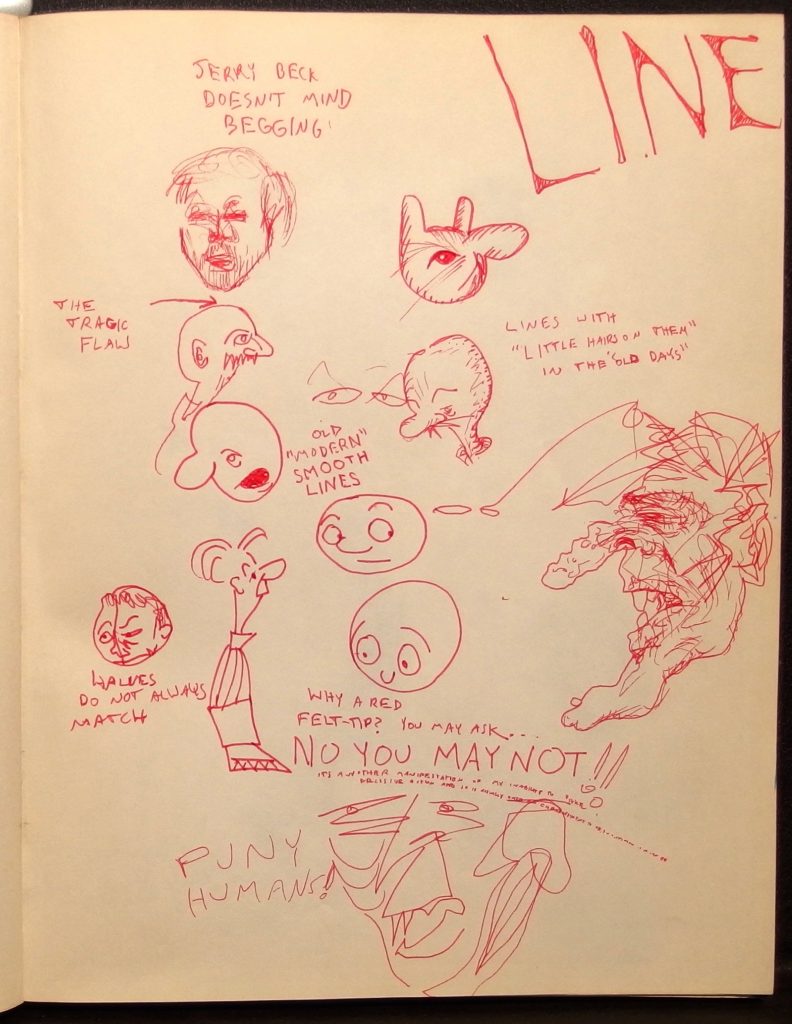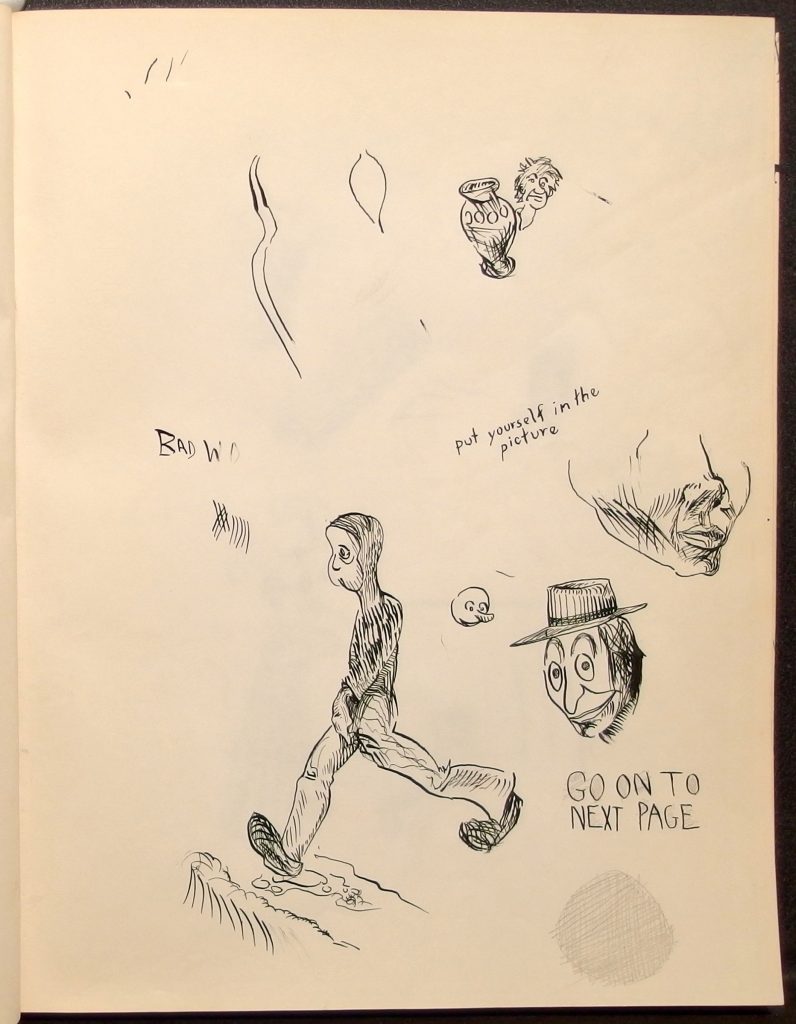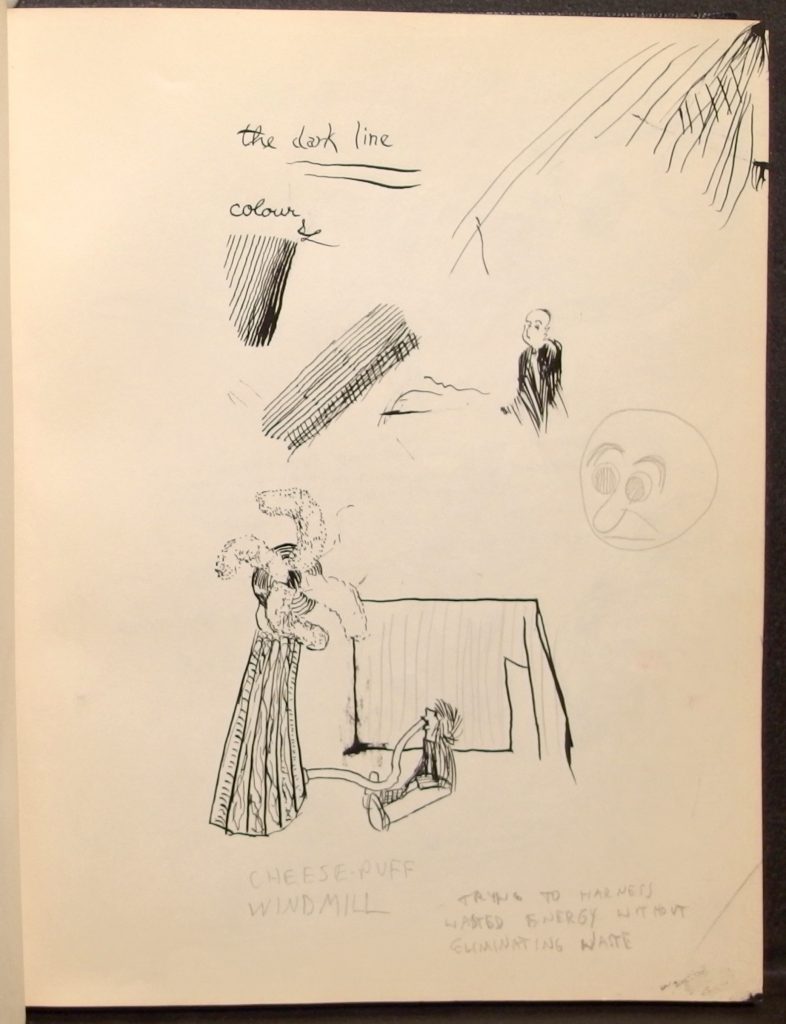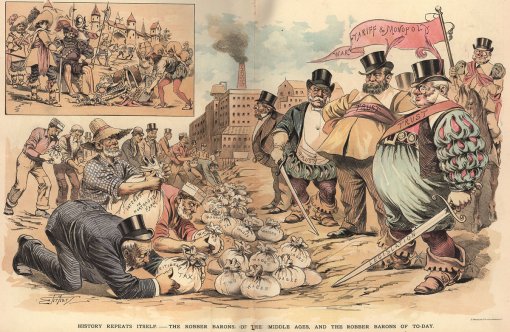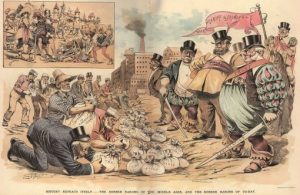Something has been falling into place for me about Elong Musk that others don’t seem to be saying, at least not much or in the popular leftist commentaries I’m seeing. It appears that he is not just another rapacious capitalist, rampant narcissist and regular bully. He is all those things; but he is likely more: a true megalomaniac. He sees himself as a prophet. Nay, a saviour; first of ‘western civilization’ (which he is probably using as a euphemism) and further of humanity itself. The last hope for humanity given the doomed nature of this planet. He may well have had some science-fiction fueled revelations while on major psychedelic trips. I can relate to that. I would have saved humanity myself a couple of times if I had seen a way to gather the resources. He, however, does see a way to control all the leftover resources of the doomed planet and shoot humanities seed into space. Or, maybe just his seed. This could be why he keeps causing all these women to push out his progeny. He envisions the universe being populated with his superior DNA. First Mars, then the stars.
Category: Social Studies
pesky blasphemers
Change Time Things So inevitable and constant and also plentiful to the point that by the time you make that last remark there's so much more you couldn't possibly have, you know, known. So, pernaps not even invoke their names? er, um, kind of a policy, you know.
Pete in ’63
This is just a little promo video for this amazing concert video I watched last night. Well, this morning actually. I suppose I should have taken a break in the middle and gone to bed around sunrise but I got caught up. This is Pete at what I think of as a peak for him. He was just beginning to become one of the biggest influences on my life, although almost entirely excluded from American media. He had only recently had his Federal prison sentence for contempt of Congress commuted. I was starting to hear his concerts through Folkways records I found in the basement of the Grandview Library, along with copies of the hard to find Sing Out! magazine in which he had a regular column called Johnny Appleseed, Jr. A new contract with Columbia Records, his first major label since the Weavers got blacklisted in the early ’50s while they were top of the hit parade, resulted in a great Carnegie Hall concert recording from this same year, but I never imagined there would be a way to actually see him performing. At the time he was blacklisted from the TV show named after a phrase he and Woody had made popular. I wonder how it would have affected me at 13 to see him as a human rather than just a disembodied voice and some dramatic still photos. Standing alone in the middle of 3,000 people who sing along reluctantly, and for some apparently cynically, at first; but by the end transformed into an emotional choir. He closed his show, before encores, with a song by “a young friend” of his, Bob Dylan. (Pete was a member of The Old Guard of folk music, 44 years old here.) “A Hard Rain…” Bob’s own record of it had barely been released when Pete did it at Carnegie Hall, and I don’t think it was being heard that much yet. If people knew of Bob at all, it was as a guy who wrote some Peter, Paul and Mary hits, but sounded too funny to actually listen to. It was interesting to see that Pete was still using crib notes on it here. He wasn’t reading it, no music stand nonsense, but you can see him glancing down at his feet between lines to check what came next.
One thing that weirdly stuck out to me, having had my ears ruined by the age of electronic tuners, was that he was never quite in tune through the whole concert. He would take a few seconds to tune, usually not the string that I was noticing was bad, but he didn’t obsess about it. Went from Drop D to standard on the 12-string, kept moving the capo up and down sometimes in the middle of a song when he decided it was not in the best key for everyone to sing, and therefore having to change the 5th string on the banjo. It seemed so obvious to me during the brief attempt at tuning that he hadn’t got it. But, he just charged right on, and once he got going it really didn’t matter a bit.
That studio clip where he is chopping the log was during a long segment on some TV show devoted to a salute to Leadbelly. After he finishes chopping through the work song, he looks up at the camera and says “Well that’s a ridiculous thing to do on TV, isn’t it? It doesn’t belong on a screen! Well, face it, folk music doesn’t belong on a stage, either.” Then he goes on and chops along to a film of Leadbelly doing “Take This Hammer.”
It’s just such a fascinating contradiction how he continually had massive success in industries he considered essentially wrong, and made a virtue of it.
Deep Science Thoughts on the Inauguration
I’ve seen it mentioned that the date for this inauguration is palindromic. (“Don’t be so palindromatic”, the lexicographers said, expunging the offending dictionary entries.) This will be the last inauguration date that is a palindrome for 1,000 years. (And I can’t wait.)
What does this mean?!?, you are wondering. I’ll tell you what it means! Well, if you are lucky enough to live in some remote isolated eden where a particular calendar is not counting up in a particular numbering system from a particular date, it might not mean sheeeeit!. However, for the rest of you, those millennia of brainwaves following that count up have had a powerful effect on certain sub-strata of quantum strings. The song those strings are playing is a kind of cosmic ear worm.
So, I tell you, it means we are standing, nay, hovering on the threshold of the conjunction with a MIRROR UNIVERSE! Which universe do we enter? Do we turn back to the weirdly familiar one which we have been inhabiting, or enter the familiarly weird MIRROR UNIVERSE?!? How would we know, having been turned around so many times we are dizzy? Which would be a better choice? How could we possibly tell?
Oh, you tell me.
Sketchbook Vol.1 p.2 ch.4
awwww, go on
Sketchbooks V1 (’59-’80) e2.2
A brief chapter with some attempts to make lines, a reference to a local celebrity, and an invention.
Patriotic Ferver (fervor meets fever. Or, A New Wave of Patriotism Blowing Through Our Pants)
(belatedly allowing the escape of this post from the last 4th of July series.)
So, the startled masses on FaceBook are wondering, “what’s all this talk about the Founding Fathers and the Post Office, Barry? We thought you were some sort of Anarchist or something?” Well, it may be proving to be true that one becomes more Conservative with age. I sometimes feel myself leaning from Anarchy toward Socialism.
To some degree it is the passing of my parents and a lot of thinking back to things they had to say during my childhood that prods me. They were great believers in the system which I came to see as hopelessly trashed by the time my intellect got the best of me. (around age 16, that is.) Little could I imagine just how much more trashed it could become, and how purposefully this was being implemented by so-called patriots, by the time I was ready to enter my dotage.
My parents believed someone was fixing things and looking out for the general good. Occasionally they would make some reference to the weird and scary stuff that went on when they were kids. They believed because they had been brought forth from the Depression with the help of public works and bank regulation. They had been saved from tainted meat and bad patent medicines by federal inspectors. Yes, my parents believed the country had been delivered forth from debtors’ prison, slavery, bank failures. (they also came of age in a culture being enriched by folk-singers and previously unheard from ethnic groups. Too bad the artists were mostly quashed as a bunch of commies and lowlifes…)
The G.I. Bill was going to help all their fellow veterans get out of their tenements when they got home from their part in the effort that stopped Fascism in WWII. Well, set it back a bit, anyway. I came to feel that the spirit of the enemy flew into our system at the end of the war; you become what you fight and all. A few more bits of history filled in the truth that fascism was here all along. Its entrenched forces in this country just kept on their friendly American masks waiting for a couple generations down the line to have forgotten certain things about ‘the good old days’. Waiting for our parents to die and us to forget and our children who never knew. Waiting along with the greedy bankers, farmers and snake oil salesmen those who would take your money by hook or by crook.
Well… they’re baaaaack.
By now, it is clear that Congress and the Statehouse are fully in the pockets of the Crooks, and this new batch of alleged outsider/maverick/reformer/tea-baggers is right in there with them. They are functionally a wholly-owned subsidiary of GlobalEvilMegaCorp, either wittingly or unwittingly. And, from what I’ve seen, I’m not taking any bets on any great presence of wit amongst this lot.
I still have a fair amount of sympathy for anti-government sentiment. (For those who don’t know, what I dearly wanted was to find a way out of here entirely to some new, small, self-sufficient sane and sustainable culture. May you get there eventually.) But, when it comes down to cases, the only part of the government these people who want to destroy from within are really against are the parts that help the people. Well, thems is the parts we needs. Being stuck here by default (yes, de fault of my own weakness) amongst all these other people who are likewise pretty pitiful and helpless, I have to admit we’re in a pickle without support for teachers, arts, fire departments, mail delivery, roads and bridges, relief from extreme poverty and hunger and homelessness, support for development of new forms of energy, clean water… hell, any water… air… … well, I’m too choked up to continue.
PABL009 – Yola My Blues Away – Skip James (1931)
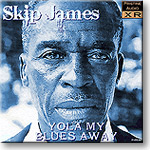 How many copies of the same records does a person need? When it comes to those mysterious and timelessly great Paramount blues records of the late ’20’s, as many as it takes. Back when we started listening to them, there would be only one source available and it would be barely audible. But, there’s no doubt that the very challenge of hearing through all those pops, crackles and hisses made us hear all the more for the effort. And the enshrouding noise enhanced the romance and air of mystery. But despite all that, there remained the nagging questions about just what notes were being played on those distant guitars; and the enduring fantasy: what if I could be there and really hear Charley Patton play and sing?
How many copies of the same records does a person need? When it comes to those mysterious and timelessly great Paramount blues records of the late ’20’s, as many as it takes. Back when we started listening to them, there would be only one source available and it would be barely audible. But, there’s no doubt that the very challenge of hearing through all those pops, crackles and hisses made us hear all the more for the effort. And the enshrouding noise enhanced the romance and air of mystery. But despite all that, there remained the nagging questions about just what notes were being played on those distant guitars; and the enduring fantasy: what if I could be there and really hear Charley Patton play and sing?
The earliest re-releases of the 78’s generally involved turning the treble down to reduce the scratchiness. Sometimes way too far down. They pre-digital Yazoo releases sometimes did different eq’s on each side of the stereo groove, sometimes to good effect. That label had the best releases, and to my ear still does a lot of the time. They get access to the best originals, and use good turntables and stylii (current transfer masters have many custom stylii of different diameters to touch different parts of the groove wall so they can find the sweet spot on different records), getting the best out of the mechanical processes before going digital.
Some of the biggest disappointments have been releases from the Columbia Roots & Blues series, which was so exciting because they actually have the original metal master parts in their vaults. But, in spite of working from these pristine sources, they seemed to feel the need to over-process, with the decisions left too much to the software, until every last trace of noise is gone but with much of the feel of the music along with it. The sound is thin and, to me, often annoying.
Well, here’s yet another guy jumping into the digital remastering pool, and with yet another approach and to different effect. Andrew Rose at Pristine Audio is working over a number of the greats.
http://www.pristineaudio.co.uk/
He is doing what he calls ‘digital heavy lifting’, working over individual phrases and moments in detail. Patching broken waveforms, working detailed multiple eq’s to try to make the guitar sound like what he thinks the guitar would have sounded like in person. In other words, remaking the record rather than trying to present it as is in best condition. These opposed approaches have advocates who will argue the issue in great detail at endless length. I’ll listen to both and wonder.
These records feature selections, rather than the ‘complete in chronological order’ programs that some labels attempt. He doesn’t have access to those ‘best copies available’ original discs, and has to content himself to working from other peoples’ transcriptions from varying sources. That, unfortunately, means that all that hard work is on top of a flawed foundation. Like all other versions before it, this can not be thought of as the ultimate. I’ll just have to keep buying every new remastering that comes along, I guess.

